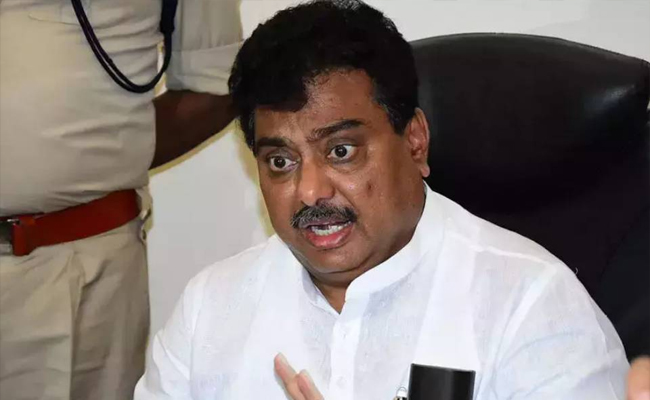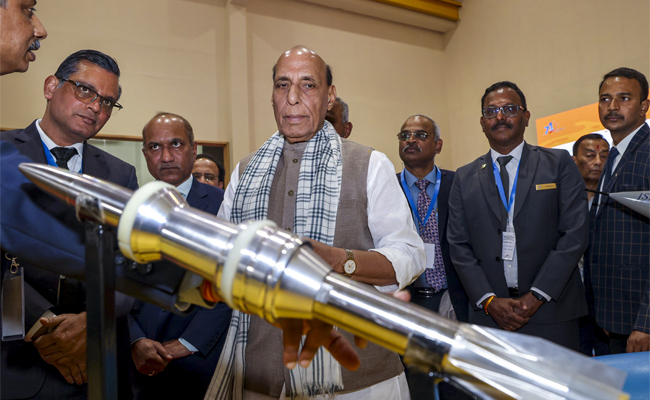Thiruvananthapuram: Robots will soon replace men in cleaning up sewer holes in Kerala, ending the age-old practice of manual scavenging in the southern state.
'Bandicoot', the robot developed by the start-up firm Genrobotics, will be used for cleaning sewer holes.
The Kerala Water Authority (KWA) and Kerala Startup Mission (KSUM) today signed an MoU for transfer of technology and products, including use of the robots for the purpose.
The MoU was signed between Kerala Water Innovation Zone under KWA and KSUM at the Chief Minister's office here, a statement said here.
'Bandicoot' will start its work, so far mostly done manually, by cleaning sewer holes in the city during the coming famed Attukal Pongala festival in Thiruvananthapuram in March, it said.
The robot has four limbs and a bucket system attached to a spider web looking extension, which can go inside the manhole.
After shoveling the heap of garbage at the bottom of the manhole, it will be collected by using the bucket system before lifting it upward.
It also has Wi-Fi and Bluetooth modules, it said.
Chief Minister Pinarayi Vijayan, Minister for Water Resources Mathew T Thomas, IT Secretary M Sivasankar, KSUM CEO Saji Gopinath, Additional Chief Secretary, Water Resources,Tom Jose, KWA officials and eight representatives from Genrobotics were present on the occasion.
KSUM had funded for the project by Genrobotics, which conducted a field study to find a solution for manual scavenging.
Meanwhile, KWA is also conducting research on the issue following the Chief Minister's instruction to find a remedy for it.
Genrobotics is planning to market the product within six months.
It has already got enquiries from states like Tamil Nadu to take it to the national-level.
Founded in 2015, GenRobotics specialises in powered exoskeletons and human controlled robotic systems.
The robot is powered by pneumatics (using gas or pressurised air) since using heavy electronic equipment inside is risky as they can react with the explosive gases present in the manhole.
The KSUM is a nodal agency of the Kerala Government for entrepreneurship development and incubation activities in the state.
Let the Truth be known. If you read VB and like VB, please be a VB Supporter and Help us deliver the Truth to one and all.
New Delhi: A visit by the US Ambassador to India, Sergio Gor, to Chandigarh on Monday has triggered sharp criticism from opposition leaders and social media users, raising questions about national security and foreign policy.
On X, Ambassador Gor announced his visit, writing, “Just landed in Chandigarh. Looking forward to visiting the Western Command of the Indian Army.”
Just landed in Chandigarh. Looking forward to visiting the Western Command of the Indian Army
— Ambassador Sergio Gor (@USAmbIndia) February 16, 2026
Soon after, opposition voices questioned the broader implications of the visit. Congress Kerala, in a post, commented, “Why so much panic? We’ve already seen Pakistan's ISI getting access to Pathankot Airbase with this government's blessings. Didn't they say then ‘Modi ne kiya ho to kuch soch samajh kar kiya hoga?’ Compared to that, this is very small.”
Why so much panic? We’ve already seen Pakistan's ISI getting access to Pathankot Airbase with this government's blessings.
— Congress Kerala (@INCKerala) February 16, 2026
Didn't they say then "Modi ne kiya ho to kuch soch samajh kar kiya hoga?"
Compared to that, this is very small. pic.twitter.com/gNNuAGQBPC
Shiv Sena (UBT) leader Priyanka Chaturvedi also weighed in, writing, “Since India’s national strategic interests are now tied to what US wants India to do, this visit seems to sync with that.”
She further added, “India’s history will remember the de-escalation announcement between India and Pak was announced on social media by the US President before Indians got to know from their own government. US Ambassador is doing the job for his nation, who is doing for us? The answer is blowing in the wind.”
Since India’s national strategic interests are now tied to what US wants India to do, this visit seems to sync with that. India’s history will remember the de-escalation announcement between India and Pak was announced on social media by the US President before Indians got to… pic.twitter.com/rYMq5NhJHA
— Priyanka Chaturvedi🇮🇳 (@priyankac19) February 16, 2026
The visit comes against the backdrop of the growing US-India defence partnership.
Writer and political analyst @rajuparulekar commented on ‘X’, “East India Company is back!”
“Is it allowed for an ambassador to visit any army unit in india?” asked another user.
Several X users expressed concerns over the appropriateness of the visit.
One asked, “Is it allowed for an ambassador to visit any army unit in India?” Another wrote, “Why an ambassador visiting our army places? To talk to Chandigarh lobby for F-35?”
Why an ambassador visiting our army places ? To talk to chandigarh lobby for f-35 ??
— Rohan Sagar (@RohanSagar03) February 16, 2026
“We have completely sold Indian sovereignty. Rothschild the evil Bankers will now control NSE. Modi sold Bharat Mata to Trump . And now American imperialist is visiting our army command . Scary,” wrote another user.
“The Indian Army isn’t part of geopolitics, so why is he interested in visiting there?,” opined another.
The Indian Army isn’t part of geopolitics, so why is he interested in visiting there?
— Aditya Pratap Singh (@Adi_IIMCIAN) February 16, 2026
On Sunday, Gor welcomed Admiral Samuel Paparo, Commander of the United States Indo-Pacific Command (INDOPACOM), highlighting efforts to expand the growing US-India defence partnership.
In a post on X, Gor wrote, “Delighted to have @INDOPACOM Commander Admiral Samuel Paparo in India to expand the U.S.-India defense partnership. Now is the time to strengthen vital cooperation between our two nations.”
On Monday, Admiral Samuel J. Paparo Jr visited the headquarters of India’s Western Army Command along with the American envoy Sergio Gor. The delegation was briefed on the formation’s capabilities, its past operations, and future plans.
The American delegation also visited Bengaluru, where they met three start-ups, two in the space sector and one in defence, and participated in an Indo-US conference.





